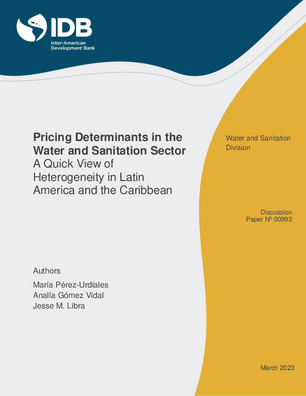Pricing Determinants in the Water and Sanitation Sector: A Quick View of Heterogeneity in Latin America and the Caribbean
Date
Mar 2023
The dual nature of water as a finite resource and as a basic human right creates a tension that presents important implications for water pricing. Water tariffs are a key tool used by policymakers to create incentive structures that promote efficient use; at the same time, they can create barriers to access and ignore waters socio-cultural value if not calibrated properly. This conflict between pricing as to reduce over-consumption and to guarantee accessibility exposes the difficulty of optimizing residential water pricing, and the importance of progressive tariff structures in building more resilient communities.Water policymakers view tariffs as an instrument to balance various objectives, such as efficiency, equity, cost recovery, and environmental preservation. However, these competing objectives mean that effective water tariff structures must be acutely customized to local contexts, a reality that is especially pertinent to Latin America and the Caribbean (LAC) due to its geographic and temporal heterogeneity in terms of water availability and demand. Prices can also be influenced by other factors. Four primary factor categories were identified as influential to water prices based on a comprehensive review of the price determination literature: (1) environmental factors, (2) urban factors, (3) political and ideological factors, and (4) management and institutional factors. The present brief examines how these factors theoretically impact pricing and what their status is throughout LAC, with the ultimate goal of providing a framework for future research.




